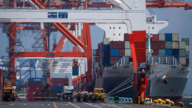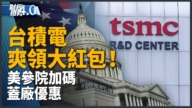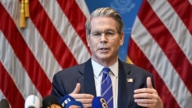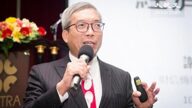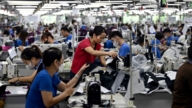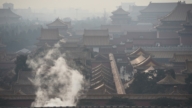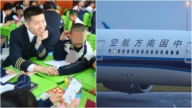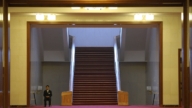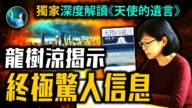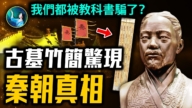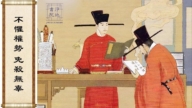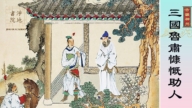【新唐人2012年2月25日讯】世界银行和中共国务院《发展研究中心》相关人员,合作撰写的一份《经济展望报告》对中国发出警告。报告说,如果中国不大规模改革国有企业的话,中国经济可能会在2030年出现严重危机。
世界银行预计将在下周公布《中国2030》报告,报告内容提出,中国如果不进行深层次改革,可能会面临经济危机。
《华尔街日报》揭露,这份报告意在影响中国下一代领导人,并挑战胡锦涛主导的经济发展模式。
《华尔街日报》说,据六位参与报告编制和审核的人士透露,这份《报告》针对中国一些在政治上极为敏感的经济问题展开论述,目地是要对中国下一代领导人产生影响。报告还对过去10年,中共国家主席胡锦涛领导下的中国经济发展模式提出了质疑。
美国《南卡罗莱纳大学艾肯商学院》教授谢田认为,世行的《报告》对中共专制政权的影响有限。
美国《南卡罗莱纳大学艾肯商学院》教授谢田:“实际上对中共这个政权这种死硬的、铁了心的,就是要走它专制道路的这样的政权,实际上只有压力,不管政治上的压力,或经济上的压力,才会真正的使中共政权有所改变。但是现在西方国家,包括世界银行和国际机构,看来没有什么意愿去对中共施加真正的压力。所以它﹙世行﹚能不能对﹙中国﹚经济问题、敏感的问题,展开论述?对中共领导人产生什么影响?这也是值得怀疑的。”
《报告》说,中国无所不在的国营企业,横跨金融、能源、基础建设、制造、房地产、通讯与影视文化,成为全球独一无二的“国家垄断集团”。
大陆国企在各行各业雇用将近9成工作人口,几乎占了国内生产毛额(GDP)的一半,然而国企透过公立银行的低利贷款,被国际批评为变相的政府补助,这是造成国企与民营企业不公平竞争的原因之一。而且,国企与地方政府投入房地产炒作,透过征收或出售土地牟利,不是以税收维持运作。
财经专栏作家廖仕明分析,中国近十几年来,经济往回走,已经达到了“国进民退”的地步,也就是国有企业在拥有政策资源之下,累积大量的自然资源和资金,挤压了民营企业的生存空间。
廖仕明表示,“国有企业”的概念就是国家拥有这些企业,但全都是以商业市场的行为去运行,所以就成了现在这种“权贵资本主义”,也就是大家所说的“裙带资本主义”。
财经专栏作家廖仕明:“中国政府这个官员和企业的老板,他们基本上形成了一个利益共同体,很难把他们拆开,这个事情现在提出来,不仅仅是经济发展的问题,他实际上触及到中国的政治体制问题,整个中国社会权力来源。”
廖仕明还表示,中国的私营企业,能获得的银行贷款占整个中国全部银行贷款,大概只有百分之二十几左右,换句话说,只能获得很少资金支持和政策支持。
财经专栏作家廖仕明:“恰恰正是政府官员,我们不说政府官员,我们说立法者、执法者、监督者,企业经营者,和一些所谓的学术专家,他们形成了一个利益共同体,他们在保护这个利益共同体,这个利益共同体涉及到中国共产党的权力问题,涉及到他们每一个官员的财富问题,所以他根本没有办法动,动了就是牵一发动全身。”
谢田提出,“中国经济走向崩溃”在十年前已经被提出,近两年,有更多的经济专家们注意到了这个可能性。廖仕明也表示,这已经不是一个简简单单的经济问题,他说,如果中共当局不改变体制的话,再多的建议也是徒劳。
新唐人记者梁欣、黄容、周天采访报导。
World Bank warns of China’s economic crisis if no reforms
The World Bank and some Development Research Center
staff from the Chinese Communist Party (CCP) State Council
co-wrote an economic outlook report that gives warnings to
China.
The report says China’s economy may have serious crisis by
2030 without fully reforming all state-owned enterprises.
The World Bank is expected to release the report “China 2030″
next week.
The report points out that if China does not conduct deep-
seated reforms, it may be facing an economic crisis.
“The Wall Street Journal" revealed that this report is intended
to influence the next generation of Chinese leaders.
It is also intended to challenge the Hu Jintao-led model
of economic development.
“The Wall Street Journal” said, according to the information
revealed by six people, who participated in the report writing
and audit, it targets some politically extremely sensitive
economic issues on Chinese politics to discuss.
The purpose is to have an impact on Chinese leaders of the
next generation.
The report also raised doubts about the economic development
model of CCP State President Hu Jintao over the past 10 years.
Xie Tian, professor of Aiken School of Business at University
of South Carolina in U.S.,
believes that the “World Bank" findings has limited impact
on the CCP autocratic regime.
Professor Xie Tian: “In fact, as the CCP regime, is so die-hard
and stubborn, it will continue on the authoritarian path.
Only pressure can change it. Either political pressure or
economic pressure is able to make the CCP regime change.
However, Western countries, including the World Bank and
others, seem unwilling to exert real pressure on the CCP.
If the World Bank can discuss China’s economic and sensitive
issues what impact it has on CCP leaders is also doubtful."
The report said the state-owned enterprises are ubiquitous in
China, including finance, energy, infrastructure, manufacturing,
real estate, communications and film and television culture.
They have become unique “national monopolies" in the world.
The state-owned enterprises in the mainland employ about 90%
of the working population, accounting for almost half the GDP.
State-owned enterprises get low-interest loans by public banks.
Criticized by the international community,
getting government subsidies in disguise.
This is one of the reasons for unfair competition of
state-owned and private enterprises.
State-owned enterprises speculate in real estate along with local
governments, obtaining profits through levy and selling land.
They do not maintain its operation through paying tax.
Financial columnist Liao Shiming analyzes, in the last decade
in China, the economy goes back,
and has reached the point of “state-owned enterprises forward,
private enterprises backwards".
State-owned enterprises have under the policy accumulated an
abundance of natural resources and funding.
They are squeezing the environment of the private enterprises.
Liao Shiming said that the concept of “state-owned enterprises”
means the sate owns the enterprises.
All of them use the behavior of the commercial market to run.
So it becomes “dignitary capitalism", like “crony capitalism".
Financial columnist Liao Shiming: “CCP government officials
and business owners, have formed a community of interests.
It is difficult to separate them. This matter is now put forward.
It is not just an issue of economic development.
It actually touched the problem of the political system in
China, the power source of the whole Chinese society."
Liao Shiming also said the loans that China’s private sector can
get from the banks are only 20% of total bank loans in China.
In other words, the private sector can only get very little
financial support and policy support.
Liao Shiming Financial columnist: “precisely the government
officials, we do not say government officials,
we say those legislators, law enforcement officers, supervisors,
business owners, and some so-called academic experts.
They have formed a community of interests. They protect
the interests of the Community.
This community of interests relate to the power of CCP,
involving each official’s wealth.
So it is not to be moved at all. To move a hair will pull the
whole body."
Xie Tian pointed out that “China’s economy is going towards
collapse” has been proposed a decade ago.
In the last two years, more economic experts noted the same
possibility. Liao Shiming also said that this is not a simple economic problem.
He said that if the CCP authorities do not change the system,
no amount of advice will make any difference.
NTD Reporters Liang Xin, Huang Rong and Zhou Tian



